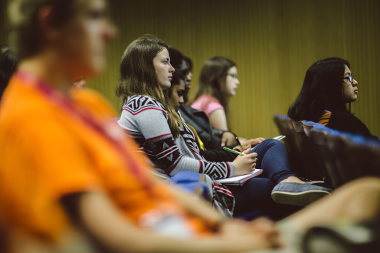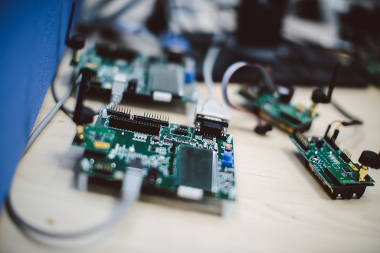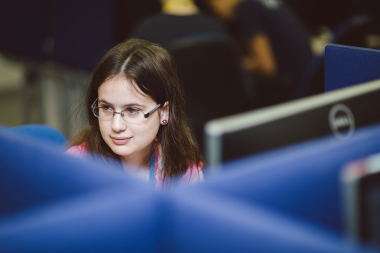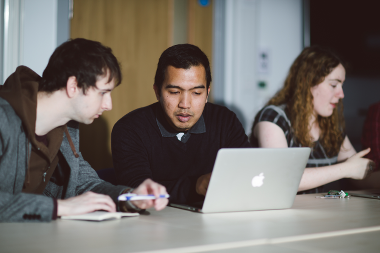How Will I be Taught?
At first, university is likely to seem very different from school. At school, you will be used to learning in a way that is directed by your teachers, getting new information in lessons and consolidating it by working through examples in class and at home. As an undergraduate student, you will find that you are very much more in charge of combining various resources to reach your own understanding of what you need to know, although there will be a great deal of support from your tutor in college and from the Department of Computer Science.
Contents |
Tutorials
 A tutorial
Like all Oxford degrees, our teaching of Computer Science revolves around the Oxford tutorial, where (typically) two students get together with a tutor to discuss their work for an hour. In your own time, you will write solutions to a set of problems, and your tutor will mark your work and then discuss it with you for an hour. You typically have two or three tutorials or classes each week, and they are normally held in your own college.
A tutorial
Like all Oxford degrees, our teaching of Computer Science revolves around the Oxford tutorial, where (typically) two students get together with a tutor to discuss their work for an hour. In your own time, you will write solutions to a set of problems, and your tutor will mark your work and then discuss it with you for an hour. You typically have two or three tutorials or classes each week, and they are normally held in your own college.
Tutorials may sound a bit daunting (especially if your tutor is the person who's written the textbook on the subject you're discussing) but you quickly get used to this in-depth style of teaching. It's this method of learning that sets Oxford (and Cambridge) apart.
Lectures
 Students at a lecture
Lectures bring together students from all colleges to
hear about some aspect of Computer Science, often from a world expert on that part of the subject.
The lectures naturally concentrate on the principles behind how computer systems work, so that what you learn will
continue to be useful long after you have graduated.
Students at a lecture
Lectures bring together students from all colleges to
hear about some aspect of Computer Science, often from a world expert on that part of the subject.
The lectures naturally concentrate on the principles behind how computer systems work, so that what you learn will
continue to be useful long after you have graduated.
You typically attend eight or nine lectures a week, and these normally happen in the Department.
Project Work
 A second year Group Design Practical project
In the second year you will take part in a group design practical, working with a group of fellow students
to design a solution to a practical problem with the support of industry partners such as Microsoft and IBM.
A second year Group Design Practical project
In the second year you will take part in a group design practical, working with a group of fellow students
to design a solution to a practical problem with the support of industry partners such as Microsoft and IBM.
In the third year, and again in the optional fourth year, you will have the opportunity to make a more extensive exploration of some of the ideas from your course by doing a project that counts for about a quarter of the exam marks in the year. You will have a project supervisor to guide your work, and might meet with them once a week.
Practicals
 A second year Group Design Practical
These give you an opportunity to work on real programs that reflect the principles you have learned,
and are a way to become familiar with up-to-date computing and programming technology.
One week you might be creating interactive computer graphics,
and another week you might be building a compiler for your own programming language,
guided by a member of staff. Practical work might occupy two afternoons a week.
A second year Group Design Practical
These give you an opportunity to work on real programs that reflect the principles you have learned,
and are a way to become familiar with up-to-date computing and programming technology.
One week you might be creating interactive computer graphics,
and another week you might be building a compiler for your own programming language,
guided by a member of staff. Practical work might occupy two afternoons a week.
Classes
We also use small classes of up to ten or twelve students to teach the specialized topics that are offered as options later on in the degree. These small classes allow students to be taught by tutors with specialist knowledge in the topic concerned, including world-renowned experts and enthusiastic young researchers. These normally happen in the Department.
Seminars
In addition to these, during term-time, the Department holds a wide range of research seminars. These aren't part of the course, but you are welcome to attend any of these that you wish to.
Popular series include Cyber Security, Information Systems, and Verification. Plus, there are the lunchtime Industry Seminars: a series of technical talks given by our partners from industry. These seminars aim to give undergraduate and graduate students a picture of the ways in which Computer Science is used to tackle and solve real-life issues. Companies taking part have included Amazon, Google, Credit Suisse, Bloomberg and many others.
Taken together, these attributes of the Oxford Computer Science course will give you a unique opportunity to deepen and enrich your understanding, and a unique preparation for a successful career, whether in computing or outside it.
What about some kind of internship or industry placement?
 We don't offer an industrial placement year as part of an Oxford Computer Science degree. However, if you're looking to get experience of industry or to make industry contacts, then you are exceptionally well-placed to do so at Oxford. For example, as a student here, you will regularly hear about all sorts of job and internship opportunities and many of our students spend the summer vacation in industrial placements, including overseas ones. We have a dedicated Industry Liaison website where companies post their relevant vacancies. The Careers Service is happy to advise and support you in getting a placement that suits you. You can find out about the kind of summer internships and work experience programmes our students go on here.
We don't offer an industrial placement year as part of an Oxford Computer Science degree. However, if you're looking to get experience of industry or to make industry contacts, then you are exceptionally well-placed to do so at Oxford. For example, as a student here, you will regularly hear about all sorts of job and internship opportunities and many of our students spend the summer vacation in industrial placements, including overseas ones. We have a dedicated Industry Liaison website where companies post their relevant vacancies. The Careers Service is happy to advise and support you in getting a placement that suits you. You can find out about the kind of summer internships and work experience programmes our students go on here.
